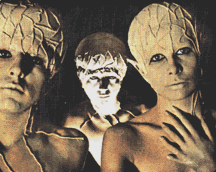
[Os Mutantes]
Brazilian modernist poet, artist and nationalist Oswald de Andrade published in 1928 his Anthropophagic Manifesto. Andrade's main ideal that he suggested here was a sort of cultural "cannibalism" which was based on artists devouring and absorbing, rather than imitating, foreign ideas and modern influences, thus creating original Brazilian work. After all, Brazilian nation itself is a fascinating outcome of racial and cultural miscegenation -- not to mention its religious syncretism -- where African, Native South American and European cultures all mix together.
In a larger context, Andrade's ideas marked a progress in passing the threshold between the conservative isolationist-minded nationalism and more free-thinking cosmopolitan internationalism. One should keep in mind that this was the same period when in Finland such people as the writer Olavi Paavolainen and the Tulenkantajat group would come up with some very similar ideas.
Forty years after his cannibalist manifesto, Andrade's ideas worked as an inspiration and were applied by the founders of Brazilian Tropicália movement in music and arts. Among these were the musicians Gilberto Gil, Caetano Veloso, Gal Costa, Tom Zé, Rogerio Duprat, the rock band Os Mutantes ("The Mutants") and the visual artist Hélio Oiticica. Musically Tropicália movement would mix together traditional Brazilian music genres with international influences: bossa nova, Portuguese fado, pop, rock and psychedelia; with a good amount of Dadaism and social satire thrown in. A collaborative album Tropicália: O Panis Et Circensis, where most artists mentioned above appeared, came out on Polygram in 1968. Politically aware Tropicálists who dressed in hippie style were not exactly in favour of Brazil's ruling military government which subsequently drove these artists underground; Veloso and Gil were imprisoned and exiled to England, returning back to Brazil only in 1972. The Tropicalia movement finally evolved into MPB (Musica Popular Brasileira).
Tropicálists eventually had their retribution when Brazilian military junta was ousted in 1985. Testament to their lasting influence must be that these days Gilberto Gil works as the Brazilian Minister of Culture. Tropicália has also been an influence on musicians outside Brazil: David Byrne has re-released on his Luaka Bop label among all the works of Os Mutantes and Tom Zé. Also Beck, Nelly Furtado and even Kurt Cobain have paid their respects to the Tropicália movement.
---
Tropicália: a revolution in Brazilian culture. A unique festival of art, music, theatre, dance and film @ Barbican Gallery, London, 16 Feb - 21 May 2006
Tropicália documentary trailer
Bread and Circuses: Os Mutantes documentary trailer


No comments:
Post a Comment